The Cite Black Women Podcast
In addition to our ongoing work on social media (Twitter, Facebook and Instagram) and our new website and blog, we also have the Cite Black Women podcast, a bi-weekly program with a simple message: Cite Black Women. "We have been producing knowledge since we blessed this earth. We theorize, we innovate, we revolutionize the world."
This bi-weekly podcast features reflections and conversations about the politics and praxis of acknowledging and centering Black women’s ideas and intellectual contributions inside and outside of the academy through citation. Episodes feature conversations with Black women inside and outside of the academy who are actively engaged in radical citation as praxis, quotes and reflections on Black women's writing, and conversations on weathering the storm of citational politics in the academy, decolonizing syllabi and more. For more information about our project follow us on Twitter, Facebook and Instagram @citeblackwomen and access our website at citeblackwomencollective.org
And don't forget to support us by subscribing to our podcast on Soundcloud, Google Play, Stitcher or iTunes.
Podcast Production Team:
Christen Smith, host and co-producer
Michaela Machicote, co-producer
Caleb Moreno, Audio Engineer
This bi-weekly podcast features reflections and conversations about the politics and praxis of acknowledging and centering Black women’s ideas and intellectual contributions inside and outside of the academy through citation. Episodes feature conversations with Black women inside and outside of the academy who are actively engaged in radical citation as praxis, quotes and reflections on Black women's writing, and conversations on weathering the storm of citational politics in the academy, decolonizing syllabi and more. For more information about our project follow us on Twitter, Facebook and Instagram @citeblackwomen and access our website at citeblackwomencollective.org
And don't forget to support us by subscribing to our podcast on Soundcloud, Google Play, Stitcher or iTunes.
Podcast Production Team:
Christen Smith, host and co-producer
Michaela Machicote, co-producer
Caleb Moreno, Audio Engineer
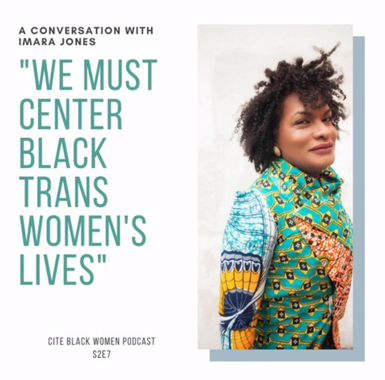
S2E7: We Must Center Black Trans Women in This Struggle - Imara Jones
In S2E7 of the Cite Black Women podcast Cite Black Women Collective member Erica Williams sits down with journalist, intersectional-news producer, and creator of TransLash, Imara Jones, to discuss her remarkable work celebrating Black trans women's lives, fighting for justice, and imagining a Black trans future.
Bio: Imara Jones, whose work has won Emmy and Peabody Awards, is the creator of TransLash Media, a cross-platform journalism, personal storytelling and narrative project, which produces content to shift the current culture of hostility towards transgender people in the US. In 2019 she chaired the first-ever UN High Level Meeting on Gender Diversity with over 600 participants. Imara’s work as a host, on-air news analyst, and writer focuses on the full-range of social justice and equity issues. Imara has been featured regularly in The Guardian, The Nation, MSNBC, CNBC, NPR, Mic, Colorlines, and is a frequent guest host of the In The Thick podcast. Imara has held economic policy posts in the Clinton White House and communications positions at Viacom. Imara holds degrees from the London School of Economics and Columbia. Imara is currently a Soros Equality Fellow and on the board of the Anti-violence Project, and the New Pride Agenda. She goes by the pronouns she/her.
Links:
TransLash.org
ImaraJones.com
In S2E7 of the Cite Black Women podcast Cite Black Women Collective member Erica Williams sits down with journalist, intersectional-news producer, and creator of TransLash, Imara Jones, to discuss her remarkable work celebrating Black trans women's lives, fighting for justice, and imagining a Black trans future.
Bio: Imara Jones, whose work has won Emmy and Peabody Awards, is the creator of TransLash Media, a cross-platform journalism, personal storytelling and narrative project, which produces content to shift the current culture of hostility towards transgender people in the US. In 2019 she chaired the first-ever UN High Level Meeting on Gender Diversity with over 600 participants. Imara’s work as a host, on-air news analyst, and writer focuses on the full-range of social justice and equity issues. Imara has been featured regularly in The Guardian, The Nation, MSNBC, CNBC, NPR, Mic, Colorlines, and is a frequent guest host of the In The Thick podcast. Imara has held economic policy posts in the Clinton White House and communications positions at Viacom. Imara holds degrees from the London School of Economics and Columbia. Imara is currently a Soros Equality Fellow and on the board of the Anti-violence Project, and the New Pride Agenda. She goes by the pronouns she/her.
Links:
TransLash.org
ImaraJones.com
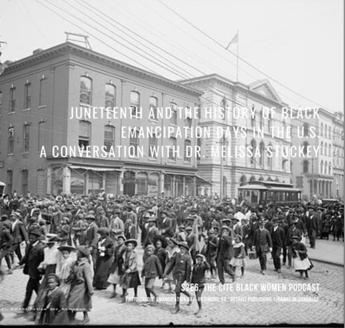
S2E6: Juneteenth and the History of Black Emancipation Days in the U.S, Dr. Melissa Stuckey
In this episode of the Cite Black Women podcast, Dr. Christen Smith sits down with Dr. Melissa Stuckey to discuss the history of Black emancipation days in the United States, Juneteenth, and the special tone this year's commemoration takes in the wake of the murder of George Floyd. Dr. Stuckey discuss the special connections between George Floyd and Juneteenth in Emancipation Park in Houston, the tradition of Emancipation Days across the country, and why the history of our freedom celebrations has everything to do with our current moment.
*Erratum! Please note In the podcast Dr. Stuckey mistakenly states that Watchnight Emancipation observation was 1863/1864. It should say 1862/1863.
Dr. Melissa N. Stuckey is assistant professor of African American history at Elizabeth City State University (ECSU) in North Carolina. She is a specialist in early twentieth century black activism and is committed to engaging the public in important conversations about black freedom struggles in the United States. Dr. Stuckey is the author of several book chapters, journal, and magazine articles including “Boley, Indian Territory: Exercising Freedom in the All Black Town,” published in 2017 in the Journal of African American History and "Freedom on Her Own Terms: California M. Taylor and Black Womanhood in Boley, Oklahoma" (forthcoming in This Land is Herland: Gendered Activism in Oklahoma, 1870s to 2010s, edited by Sarah Eppler Janda and Patricia Loughlin, University of Oklahoma Press, 2020).
Stuckey is currently completing her first book, entitled “All Men Up”: Seeking Freedom in the All-Black Town of Boley, Oklahoma, which interrogates the black freedom struggle in Oklahoma as it took shape in the state’s largest all-black town. Stuckey is also working on several public history projects. She has been awarded grants from the National Parks Service and the Institute for Museum and Library Services to rehabilitate a historic Rosenwald school on ECSU's campus and to preserve the history and legacy of these important African American institutions. In addition, she is a contributing historian on the NEH-funded “Free and Equal Project” in Beaufort, South Carolina, which is interpreting the story of Reconstruction for national and international audiences and is senior historical consultant to the Coltrane Group, a non-profit organization in Oklahoma committed to economic development and historic rehabilitation in the thirteen remaining historically black towns in that state.
In this episode of the Cite Black Women podcast, Dr. Christen Smith sits down with Dr. Melissa Stuckey to discuss the history of Black emancipation days in the United States, Juneteenth, and the special tone this year's commemoration takes in the wake of the murder of George Floyd. Dr. Stuckey discuss the special connections between George Floyd and Juneteenth in Emancipation Park in Houston, the tradition of Emancipation Days across the country, and why the history of our freedom celebrations has everything to do with our current moment.
*Erratum! Please note In the podcast Dr. Stuckey mistakenly states that Watchnight Emancipation observation was 1863/1864. It should say 1862/1863.
Dr. Melissa N. Stuckey is assistant professor of African American history at Elizabeth City State University (ECSU) in North Carolina. She is a specialist in early twentieth century black activism and is committed to engaging the public in important conversations about black freedom struggles in the United States. Dr. Stuckey is the author of several book chapters, journal, and magazine articles including “Boley, Indian Territory: Exercising Freedom in the All Black Town,” published in 2017 in the Journal of African American History and "Freedom on Her Own Terms: California M. Taylor and Black Womanhood in Boley, Oklahoma" (forthcoming in This Land is Herland: Gendered Activism in Oklahoma, 1870s to 2010s, edited by Sarah Eppler Janda and Patricia Loughlin, University of Oklahoma Press, 2020).
Stuckey is currently completing her first book, entitled “All Men Up”: Seeking Freedom in the All-Black Town of Boley, Oklahoma, which interrogates the black freedom struggle in Oklahoma as it took shape in the state’s largest all-black town. Stuckey is also working on several public history projects. She has been awarded grants from the National Parks Service and the Institute for Museum and Library Services to rehabilitate a historic Rosenwald school on ECSU's campus and to preserve the history and legacy of these important African American institutions. In addition, she is a contributing historian on the NEH-funded “Free and Equal Project” in Beaufort, South Carolina, which is interpreting the story of Reconstruction for national and international audiences and is senior historical consultant to the Coltrane Group, a non-profit organization in Oklahoma committed to economic development and historic rehabilitation in the thirteen remaining historically black towns in that state.
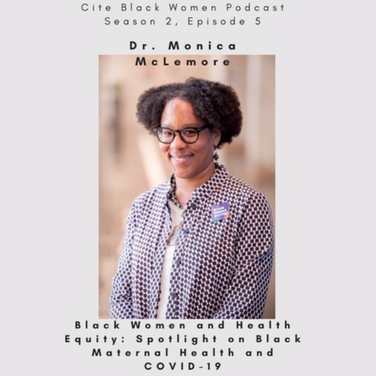
S2E5: Black Women and Health Equity: Spotlight on Black Maternal Health and COVID-19
CBW Collective member Dr. Whitney Pirtle speaks with Dr. Monica McLemore about her career trajectory, moving from her long-time position as a clinical public health nurse to becoming a prominent researcher on Black maternal health and reproductive justice. They discuss the importance of centering and listening to Black women in reaching health equity, and why this matters especially in the current COVID-19 pandemic cris
Dr Monica McLemore, a tenured associate professor in the Family Health Care Nursing Department at the University of California, San Francisco, an affiliated scientist with Advancing New Standards in Reproductive Health, and a member of the Bixby Center for Global Reproductive Health.
Dr. McLemore retired from clinical practice as a public health and staff nurse after a 28-year clinical nursing career. Her research is grounded in reproductive justice across the reproductive spectrum including abortion, birth, cancer risk, contraception, family planning, and healthy sexuality, pleasure, and consent.
She has over 50 peer reviewed articles, OpEds and commentaries and her research has been cited in places including the Huffington Post, Lavender Health, a National Academies of Science, Engineering, and Medicine report. AND three amicus briefs to the Supreme Court of the United States. She is an elected member of the governing council and chair-elect for Sexual and Reproductive Health (SRH) section of the American Public Health Association. She is recipient of numerous awards and was recently inducted into the American Academy of Nursing in October, 2019.
Whitney Pirtle PhD is an Assistant Professor of Sociology and affiliated faculty in Critical Race and Ethnic Studies and Public Health at the University of California Merced. Her areas of expertise are in race and nation, racial/ethnic health disparities and equity, Black feminist sociology, and mixed methodologies. Pirtle oversees the Sociology of Health and Equity (SHE) Lab at UC Merced and is a Cite Black Women Collective member.
CBW Collective member Dr. Whitney Pirtle speaks with Dr. Monica McLemore about her career trajectory, moving from her long-time position as a clinical public health nurse to becoming a prominent researcher on Black maternal health and reproductive justice. They discuss the importance of centering and listening to Black women in reaching health equity, and why this matters especially in the current COVID-19 pandemic cris
Dr Monica McLemore, a tenured associate professor in the Family Health Care Nursing Department at the University of California, San Francisco, an affiliated scientist with Advancing New Standards in Reproductive Health, and a member of the Bixby Center for Global Reproductive Health.
Dr. McLemore retired from clinical practice as a public health and staff nurse after a 28-year clinical nursing career. Her research is grounded in reproductive justice across the reproductive spectrum including abortion, birth, cancer risk, contraception, family planning, and healthy sexuality, pleasure, and consent.
She has over 50 peer reviewed articles, OpEds and commentaries and her research has been cited in places including the Huffington Post, Lavender Health, a National Academies of Science, Engineering, and Medicine report. AND three amicus briefs to the Supreme Court of the United States. She is an elected member of the governing council and chair-elect for Sexual and Reproductive Health (SRH) section of the American Public Health Association. She is recipient of numerous awards and was recently inducted into the American Academy of Nursing in October, 2019.
Whitney Pirtle PhD is an Assistant Professor of Sociology and affiliated faculty in Critical Race and Ethnic Studies and Public Health at the University of California Merced. Her areas of expertise are in race and nation, racial/ethnic health disparities and equity, Black feminist sociology, and mixed methodologies. Pirtle oversees the Sociology of Health and Equity (SHE) Lab at UC Merced and is a Cite Black Women Collective member.
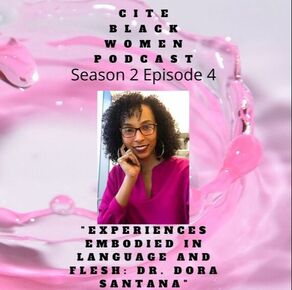
Season 2 Episode 4: "Experiences Embodied in Language and Flesh"
In celebration of International Transgender Day of Visibility 2020, CBW Collective member Michaela Machicote talks with trans woman warrior, scholar, activist, artist, and story-teller, Dr. Dora Santana, about experiences embodied in language and flesh. Dr. Santana is an assistant professor of Gender Studies at John Jay College CUNY and holds a PhD in African and African Diaspora Studies by the University of Texas at Austin. Her work has been published in the Transgender Studies Quarterly – TSQ – The Issue of Blackness under the title “Transitionings and Returnings: Experiments with the Poetics of Transatlantic Water,” where she emphasizes the healing role of ancestral energies in the African Diaspora as an important embodied knowledge that guides black trans people in their path of resistant and transitioning across imposed limits of gender, geographies and the secular. She also published in TSQ Trans En Las Americas, whose title is "Mais Viva: Reassembling Transness, Blackness, and Feminism." She is currently working on her book, Trans Stellar Knot-works: Afro Diasporic Technologies, Transtopias, and Accessible Futures, where she centers the knowledge production by and on Black trans women in the Black Diaspora through a range of digital and embodied media, especially in Brazil, the U.S., and African countries such as Angola.
In celebration of International Transgender Day of Visibility 2020, CBW Collective member Michaela Machicote talks with trans woman warrior, scholar, activist, artist, and story-teller, Dr. Dora Santana, about experiences embodied in language and flesh. Dr. Santana is an assistant professor of Gender Studies at John Jay College CUNY and holds a PhD in African and African Diaspora Studies by the University of Texas at Austin. Her work has been published in the Transgender Studies Quarterly – TSQ – The Issue of Blackness under the title “Transitionings and Returnings: Experiments with the Poetics of Transatlantic Water,” where she emphasizes the healing role of ancestral energies in the African Diaspora as an important embodied knowledge that guides black trans people in their path of resistant and transitioning across imposed limits of gender, geographies and the secular. She also published in TSQ Trans En Las Americas, whose title is "Mais Viva: Reassembling Transness, Blackness, and Feminism." She is currently working on her book, Trans Stellar Knot-works: Afro Diasporic Technologies, Transtopias, and Accessible Futures, where she centers the knowledge production by and on Black trans women in the Black Diaspora through a range of digital and embodied media, especially in Brazil, the U.S., and African countries such as Angola.
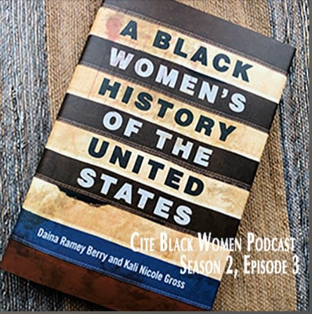
S2E3: A Black Women's History of the United States
In this special Women's History Month episode Ph.D. student Tiana Wilson sits down with Drs. Daina Ramey Berry and Kali Nicole Gross to discuss their most recent book, A Black Women's History of the United States.
Daina Ramey Berry holds the Oliver H. Radkey Regents Professorship of History and is a Fellow of Walter Prescott Webb Chair in History and the George W. Littlefield Professorship in American History at the University of Texas at Austin. She is also the Associate Dean of The Graduate School and director of the American Association of Universities PhD Education Initiative at UT Austin. Berry is the award-winning author and editor of six books and several scholarly articles including A Black Women’s History of the United States (with Kali Nicole Gross, Beacon, 2020); The Price for their Pound of Flesh: The Value of the Enslaved, from Womb to the Grave, in the Building of a Nation (Beacon, 2017); and Swing the Sickle for the Harvest is Ripe: Gender and Slavery in Antebellum Georgia (Illinois, 2007).
Kali Nicole Gross is the Martin Luther King, Jr. Professor of History at Rutgers University–New Brunswick and she is the National Publications Director for the Association of Black Women Historians. Her expertise and opinion pieces have been featured in press outlets such as BBC News, Vanity Fair, TIME, HuffPo, The Root, and The Washington Post. She has appeared on venues such as ABC, NBC, NPR, and C-Span. Her award-winning books include Colored Amazons: Crime, Violence, and Black Women in the City of Brotherly Love, 1880–1910 (Duke University Press, 2006) and Hannah Mary Tabbs and the Disembodied Torso: A Tale of Race, Sex, and Violence in America (Oxford University Press, 2016). Her latest book, co-authored with Daina Ramey Berry, is A Black Women’s History of the United States (Beacon Press, 2020). Follow her on Twitter @KaliGrossPhD
Tiana Wilson is a third-year doctoral student in the Department of History with a portfolio in Women and Gender Studies, here at UT-Austin. Her broader research interests include: Black Women’s Internationalism, Black Women’s Intellectual History, Women of Color Organizing, and Third World Feminism. More specifically, her dissertation explores women of color feminist movements in the U.S. from the 1960s to the present. At UT, she is the Graduate Research Assistant for the Institute for Historical Studies, coordinator of the New Work in Progress Series, and a research fellow for the Center for the Study of Race and Democracy.
In this special Women's History Month episode Ph.D. student Tiana Wilson sits down with Drs. Daina Ramey Berry and Kali Nicole Gross to discuss their most recent book, A Black Women's History of the United States.
Daina Ramey Berry holds the Oliver H. Radkey Regents Professorship of History and is a Fellow of Walter Prescott Webb Chair in History and the George W. Littlefield Professorship in American History at the University of Texas at Austin. She is also the Associate Dean of The Graduate School and director of the American Association of Universities PhD Education Initiative at UT Austin. Berry is the award-winning author and editor of six books and several scholarly articles including A Black Women’s History of the United States (with Kali Nicole Gross, Beacon, 2020); The Price for their Pound of Flesh: The Value of the Enslaved, from Womb to the Grave, in the Building of a Nation (Beacon, 2017); and Swing the Sickle for the Harvest is Ripe: Gender and Slavery in Antebellum Georgia (Illinois, 2007).
Kali Nicole Gross is the Martin Luther King, Jr. Professor of History at Rutgers University–New Brunswick and she is the National Publications Director for the Association of Black Women Historians. Her expertise and opinion pieces have been featured in press outlets such as BBC News, Vanity Fair, TIME, HuffPo, The Root, and The Washington Post. She has appeared on venues such as ABC, NBC, NPR, and C-Span. Her award-winning books include Colored Amazons: Crime, Violence, and Black Women in the City of Brotherly Love, 1880–1910 (Duke University Press, 2006) and Hannah Mary Tabbs and the Disembodied Torso: A Tale of Race, Sex, and Violence in America (Oxford University Press, 2016). Her latest book, co-authored with Daina Ramey Berry, is A Black Women’s History of the United States (Beacon Press, 2020). Follow her on Twitter @KaliGrossPhD
Tiana Wilson is a third-year doctoral student in the Department of History with a portfolio in Women and Gender Studies, here at UT-Austin. Her broader research interests include: Black Women’s Internationalism, Black Women’s Intellectual History, Women of Color Organizing, and Third World Feminism. More specifically, her dissertation explores women of color feminist movements in the U.S. from the 1960s to the present. At UT, she is the Graduate Research Assistant for the Institute for Historical Studies, coordinator of the New Work in Progress Series, and a research fellow for the Center for the Study of Race and Democracy.
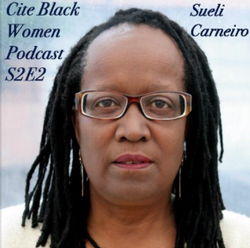
S2E2: Uma Conversa com Dra. Sueli Carneiro
Neste episódio especial para o Dia Internacional da Mulher/Dia Internacional de la Mujer, sentamos com a Dra. Sueli Carneiro, filósofa e fundadora do Geledés, Instituto da Mulher Negra do Brasil, para dialogar sobre a importância de enegrecer o feminismo, a problemática da mulher negra, e o futuro do feminismo. O podcast foi gravado durante o congresso Black Women’s Intellectual Contributions to the Americas: Perspectives from the Global South, na Universidade do Texas em Austin, 20-21 de fevereiro 2020.
Sueli Carneiro é filósofa afro-brasileira, ativista anti-racista, e autora eminente sobre o feminismo negro no Brasil. Foi fundadora, em 1988, de Geledés Instituto da Mulher Negra, organização preeminente do feminismo negro e líder na luta contra o racismo e a discriminação de gênero no Brasil. Pouco depois de fundar Geledés, foi convidada para participar no Conselho Nacional da Condição Feminina em Brasília. Como parte de seu trabalho com Geledés, estabeleceu o programa de direitos humanos. Também fundou SOS Racismo, um programa que oferece conselhos legais de graça para vítimas da discriminação racial em São Paulo. Carneiro se formou em filosofia na Universidade de São Paulo e recebeu o doutorado em educação da mesma instituição. É ativista no movimento negro feminista brasileira desde o final da década 1970. Geledes: www.geledes.org.br
Black Women’s Intellectual Contributions to the Americas: Perspectives from the Global South: sites.utexas.edu/lozanolongconference2020/
Neste episódio especial para o Dia Internacional da Mulher/Dia Internacional de la Mujer, sentamos com a Dra. Sueli Carneiro, filósofa e fundadora do Geledés, Instituto da Mulher Negra do Brasil, para dialogar sobre a importância de enegrecer o feminismo, a problemática da mulher negra, e o futuro do feminismo. O podcast foi gravado durante o congresso Black Women’s Intellectual Contributions to the Americas: Perspectives from the Global South, na Universidade do Texas em Austin, 20-21 de fevereiro 2020.
Sueli Carneiro é filósofa afro-brasileira, ativista anti-racista, e autora eminente sobre o feminismo negro no Brasil. Foi fundadora, em 1988, de Geledés Instituto da Mulher Negra, organização preeminente do feminismo negro e líder na luta contra o racismo e a discriminação de gênero no Brasil. Pouco depois de fundar Geledés, foi convidada para participar no Conselho Nacional da Condição Feminina em Brasília. Como parte de seu trabalho com Geledés, estabeleceu o programa de direitos humanos. Também fundou SOS Racismo, um programa que oferece conselhos legais de graça para vítimas da discriminação racial em São Paulo. Carneiro se formou em filosofia na Universidade de São Paulo e recebeu o doutorado em educação da mesma instituição. É ativista no movimento negro feminista brasileira desde o final da década 1970. Geledes: www.geledes.org.br
Black Women’s Intellectual Contributions to the Americas: Perspectives from the Global South: sites.utexas.edu/lozanolongconference2020/
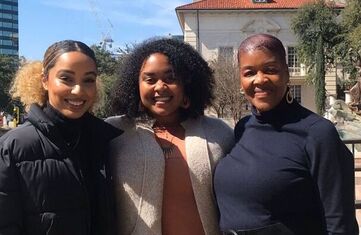
Season Two of Cite Black Women kicks off with various interviews in English and Portuguese by panelists from the 2020 Lozano Long Conference "Black Women's Intellectual Contributions to the Americas" at the University of Texas at Austin.
Episode 1 of Season 2 features a conversation between Carole Boyce Davies, Yomaira Figueroa, and Bedour Alagraa on Sylvia Wynter.
Episode 1 of Season 2 features a conversation between Carole Boyce Davies, Yomaira Figueroa, and Bedour Alagraa on Sylvia Wynter.
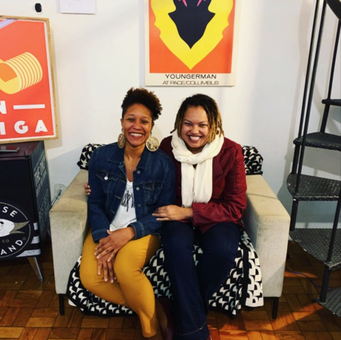
SPECIAL Episode - Brazilian Poet Elizandra Souza (in Portuguese)
In this special episode of the Cite Black Women Podcast—our first in Portuguese— host Christen Smith talks with poet and activist Elizandra Souza of São Paulo, Brazil.
Elizandra Souza é uma das referências em literatura negra produzida nas periferias de São Paulo, com uma trajetória de 18 anos de ativismo cultural. é escritora, poeta, jornalista formada em Comunicação Social pela Universidade Presbiteriana Mackenzie e técnica em Comunicação Visual pela Etec Carlos de Campos. É ativista cultural há 18 anos com ênfase na difusão do jornalismo cultural da Periferia e da Literatura Negra Feminina. Integrante fundadora do Sarau das Pretas desde 2016. Autora dos livros de poesias: Águas da Cabaça (2012) e Punga co-autoria Akins Kintê, Edicões Toró (2007). Editora do Coletivo Mjiba dos livros: Águas da Cabaça (2012), Pretextos de Mulheres Negras (2013) e Terra Fértil (2014). Participa de diversas antologias literárias. Atuou como editora e jornalista responsável na Agenda Cultural da Periferia na Ação Educativa (2007- 2017) Participou do Festival Internacional de Poesia em Havana (Cuba), 2016 e do Congresso LASA / Nuestra América: Justice and Inclusion em Boston (EUA), 2019.
In this special episode of the Cite Black Women Podcast—our first in Portuguese— host Christen Smith talks with poet and activist Elizandra Souza of São Paulo, Brazil.
Elizandra Souza é uma das referências em literatura negra produzida nas periferias de São Paulo, com uma trajetória de 18 anos de ativismo cultural. é escritora, poeta, jornalista formada em Comunicação Social pela Universidade Presbiteriana Mackenzie e técnica em Comunicação Visual pela Etec Carlos de Campos. É ativista cultural há 18 anos com ênfase na difusão do jornalismo cultural da Periferia e da Literatura Negra Feminina. Integrante fundadora do Sarau das Pretas desde 2016. Autora dos livros de poesias: Águas da Cabaça (2012) e Punga co-autoria Akins Kintê, Edicões Toró (2007). Editora do Coletivo Mjiba dos livros: Águas da Cabaça (2012), Pretextos de Mulheres Negras (2013) e Terra Fértil (2014). Participa de diversas antologias literárias. Atuou como editora e jornalista responsável na Agenda Cultural da Periferia na Ação Educativa (2007- 2017) Participou do Festival Internacional de Poesia em Havana (Cuba), 2016 e do Congresso LASA / Nuestra América: Justice and Inclusion em Boston (EUA), 2019.
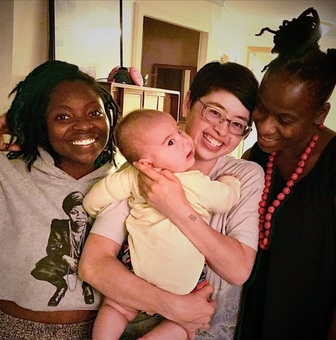
S1E11: The Church of Black Feminist Thought
A conversation between Cite Black Women Collective member Imani Wadud and the two co-coveners of The Church of Black Feminist Thought: Miyuki Baker and Ra Malika Imhotep. This graduate student spotlight explores The Church of Black Feminist Thought's powerful vision, praxis, and embodied citation. For more info on The Church of Black Feminist Thought check out their site: www.blackfeministstudy.org
A conversation between Cite Black Women Collective member Imani Wadud and the two co-coveners of The Church of Black Feminist Thought: Miyuki Baker and Ra Malika Imhotep. This graduate student spotlight explores The Church of Black Feminist Thought's powerful vision, praxis, and embodied citation. For more info on The Church of Black Feminist Thought check out their site: www.blackfeministstudy.org
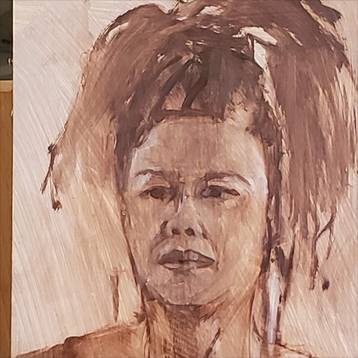 [*Cover Photo: Vilna Treitler Self Portrait]
[*Cover Photo: Vilna Treitler Self Portrait]
Season 1 Episode 10: Dr. Vilna Treitler on Trauma, Resilience, Memoir and Artistic Vision
At the American Sociological Meeting 2019, Christen Smith had the pleasure of sitting down with Dr. Vilna Treitler. In this conversation, she discusses her experiences with trauma and resilience, mentorship, her work as a visual artist and her newest project: her memoir.
Vilna Bashi Treitler is Professor of Black Studies at the University of California Santa Barbara, a sociologist, and an artist. Her scholarship theorizes about international migration, race and ethnicity and the dynamics of hierarchical socioeconomic structures, and she has earned distinctions for expertise in qualitative methods. Bashi Treitler is the author of The Ethnic Project: Transforming Racial Fiction into Ethnic Factions, a comparative historical analysis of US ethnic groups’ racialization and the antiblackness it produces, and Survival of the Knitted: Immigrant Social Networks in a Stratified World, a study of the help immigrants get from the transnational aid networks they create for themselves. She is also editor of the book Race in Transnational and Transracial Adoption, on the racialization of children made available domestically and internationally by displacement and misfortune, and a monograph issue of Current Sociology entitled Dynamics of Inequality in a Global Perspective. She has served as Vice President of the Eastern Sociological Society, and as Vice Chair of the UN NGO Committee on the Elimination of Racism, Afrophobia, and Colorism. Her art centers on oil painting and glasswork, and she cares deeply about social justice and human rights, so she moves in and out of activism as much as her other obligations allow.
At the American Sociological Meeting 2019, Christen Smith had the pleasure of sitting down with Dr. Vilna Treitler. In this conversation, she discusses her experiences with trauma and resilience, mentorship, her work as a visual artist and her newest project: her memoir.
Vilna Bashi Treitler is Professor of Black Studies at the University of California Santa Barbara, a sociologist, and an artist. Her scholarship theorizes about international migration, race and ethnicity and the dynamics of hierarchical socioeconomic structures, and she has earned distinctions for expertise in qualitative methods. Bashi Treitler is the author of The Ethnic Project: Transforming Racial Fiction into Ethnic Factions, a comparative historical analysis of US ethnic groups’ racialization and the antiblackness it produces, and Survival of the Knitted: Immigrant Social Networks in a Stratified World, a study of the help immigrants get from the transnational aid networks they create for themselves. She is also editor of the book Race in Transnational and Transracial Adoption, on the racialization of children made available domestically and internationally by displacement and misfortune, and a monograph issue of Current Sociology entitled Dynamics of Inequality in a Global Perspective. She has served as Vice President of the Eastern Sociological Society, and as Vice Chair of the UN NGO Committee on the Elimination of Racism, Afrophobia, and Colorism. Her art centers on oil painting and glasswork, and she cares deeply about social justice and human rights, so she moves in and out of activism as much as her other obligations allow.
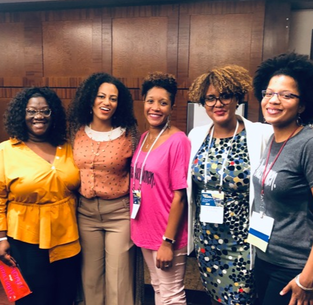
This episode features the recorded audio from the panel Cite Black Women: Centering and Celebrating Black Women in Sociology, that took place at the American Sociological Association Meeting in 2019: What started out as a small idea on twitter turned out to be a mini-movement in Philly. On the Saturday of 2018 ASA conference, scores of sociologists were seen donning t-shirts adorned only with simple writing #CITEBLACKWOMEN and the message was clear. It was a call out to cite black women as a tool to fight the intellectual and positional erasure of black women and their merits in the academy. This panel seeks to ensure that the 2018 moment might transition to a larger movement that centers and celebrates black women sociologists. Questions the panelist will address include: Who belongs in the cannon of black women sociologists and who are the contemporary innovators? Who is even included (or who is excluded) when we say, black women? What guides our gatekeeping practices in publishing and how can we make them more inclusive and equitable? What might we lose if we don’t listen to black women today? How might we make this symbolic gesture of #citeblackwomen into something more praxis oriented? Beyond citing black women, how can we further support black women in our discipline and the academy?
Panelists (in speaking order):
(Organizer) Dr. Whitney N L Pirtle, Assistant Professor of Sociology at the University of California, Merced. whitneylpirtle.com
Dr. Christen Smith, founder of Cite Black Women. and Associate Profesor of African and African Diaspora Studies and Anthropology at the University of Texas at Austin. www.afro-paradise.com
Dr. Crystal Marie Fleming, Associate Professor of Sociology, Africana Studies and Women's, Gender and Sexuality Studies at Stony Brook University. www.crystalfleming.com
Dr. Tressie McMillan Cottom is digital sociologist, professor, writer and columnist. She is an associate professor of sociology at Virginia Commonwealth University and a faculty associate of the Berkman Klein Center for Internet & Society. tressiemc.com
Dr. Zakiya Luna is Assistant Professor of Sociology at The University of California Santa Bárbara. www.zakiyaluna.com
Panelists (in speaking order):
(Organizer) Dr. Whitney N L Pirtle, Assistant Professor of Sociology at the University of California, Merced. whitneylpirtle.com
Dr. Christen Smith, founder of Cite Black Women. and Associate Profesor of African and African Diaspora Studies and Anthropology at the University of Texas at Austin. www.afro-paradise.com
Dr. Crystal Marie Fleming, Associate Professor of Sociology, Africana Studies and Women's, Gender and Sexuality Studies at Stony Brook University. www.crystalfleming.com
Dr. Tressie McMillan Cottom is digital sociologist, professor, writer and columnist. She is an associate professor of sociology at Virginia Commonwealth University and a faculty associate of the Berkman Klein Center for Internet & Society. tressiemc.com
Dr. Zakiya Luna is Assistant Professor of Sociology at The University of California Santa Bárbara. www.zakiyaluna.com

This week's episode of the Cite Black Women podcast is in commemoration of Ida B. Well's birthday (07/16/1862). Cite Black Women Collective member Michaela Machicote speaks with Professor Michelle Duster: scholar, community advocate, and the paternal great granddaughter of Ida B. Wells. In this episode we discuss Duster's scholarship, her commitment to memorializing Wells in Chicago, and her career trajectory.
Michelle Duster is an author, speaker, and educator who believes it is essential that the contributions women and African Americans made to the United States be told in a more complete and accurate way. She is active with various local and national public history projects, committees, and organizations that create, document and promote the many “untold” stories. She has written articles for several publications including Essence, Huffington Post and Teen Vogue and is a regular contributor to The North Star. In the last dozen years, Michelle’s writing has been included in nine books. She co-edited Shifts: An Anthology of Women’s Growth Through Change, co-wrote the popular children’s history book, Tate and His Historic Dream, plus wrote and edited two books that include the writings of her great-grandmother, Ida B. Wells - Ida In Her Own Words and Ida From Abroad. Her most recent book that she co-edited is Michelle Obama’s Impact on African American Women and Girls.
She was born and raised on the South Side of Chicago. She earned her B.A. in Psychology from Dartmouth College and her M.A. in Media Studies from The New School in New York City. She has received numerous awards including the 2019 Martin Luther King Jr. Social Justice Award from Dartmouth College. She teaches business writing at Columbia College Chicago. She is currently working on a pop-culture biography of her great-grandmother Ida B. Wells titled Ida B. The Queen, and several other writing and public history projects to be completed in the next two years.
Keep up with her at MLDwrites.com, Musewrites.com, and @MichelleDuster on Twitter!
Michelle Duster is an author, speaker, and educator who believes it is essential that the contributions women and African Americans made to the United States be told in a more complete and accurate way. She is active with various local and national public history projects, committees, and organizations that create, document and promote the many “untold” stories. She has written articles for several publications including Essence, Huffington Post and Teen Vogue and is a regular contributor to The North Star. In the last dozen years, Michelle’s writing has been included in nine books. She co-edited Shifts: An Anthology of Women’s Growth Through Change, co-wrote the popular children’s history book, Tate and His Historic Dream, plus wrote and edited two books that include the writings of her great-grandmother, Ida B. Wells - Ida In Her Own Words and Ida From Abroad. Her most recent book that she co-edited is Michelle Obama’s Impact on African American Women and Girls.
She was born and raised on the South Side of Chicago. She earned her B.A. in Psychology from Dartmouth College and her M.A. in Media Studies from The New School in New York City. She has received numerous awards including the 2019 Martin Luther King Jr. Social Justice Award from Dartmouth College. She teaches business writing at Columbia College Chicago. She is currently working on a pop-culture biography of her great-grandmother Ida B. Wells titled Ida B. The Queen, and several other writing and public history projects to be completed in the next two years.
Keep up with her at MLDwrites.com, Musewrites.com, and @MichelleDuster on Twitter!
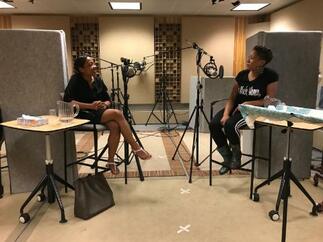
Ashley Farmer is a historian of black women's history, intellectual history, and radical politics. She is currently an Assistant Professor in the Departments of History and African and African Diaspora Studies at the University of Texas- Austin. Her book, Remaking Black Power: How Black Women Transformed an Era, is the first comprehensive study of black women's intellectual production and activism in the Black Power era. She is also the co-editor of New Perspectives on the Black Intellectual Tradition. Dr. Farmer's scholarship has appeared in numerous venues including The Black Scholar and The Journal of African American History. Her research has also been featured in several popular outlets including Vibe, NPR, and The Chronicle Review. Farmer earned her BA from Spelman College, an MA in History and a PhD in African American Studies from Harvard University.
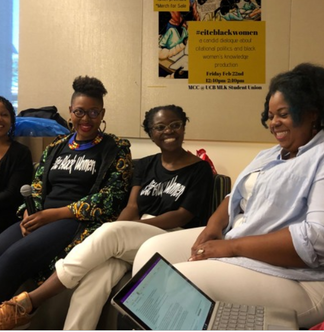
On Friday February 22, 2019, the Black Graduate Students Association in collaboration with the LUTA initiative at the University of California Berkeley held a special Cite Black Women event alongside the ANTI-BLACK STATE VIOLENCE ACROSS THE AMERICAS symposium that occurred on campus at the same time. This Cite Black Women event, organized by Caleb Dawson in collaboration with Ayana Flewellen, Derrika Hunt, Malika Imhotep and Regan Patterson, brought together dozens of people from the campus community and featured a candid dialogue about citational politics and Black women’s knowledge.
In addition, special guest Andreia Beatriz dos Santos, the co-founder of the Winnie Mandela School in Salvador, Bahia, Brazil (our t-shirt sales proceeds go to this school) was also in attendance. This candid and vibrant conversation represents the next generation of the Cite Black Women initiative - young scholars talking about the ways that citational practices influence their graduate school experiences and beyond. Enjoy.
In addition, special guest Andreia Beatriz dos Santos, the co-founder of the Winnie Mandela School in Salvador, Bahia, Brazil (our t-shirt sales proceeds go to this school) was also in attendance. This candid and vibrant conversation represents the next generation of the Cite Black Women initiative - young scholars talking about the ways that citational practices influence their graduate school experiences and beyond. Enjoy.

In this last episode for Black History Month 2019, Cite Black Women founder Christen Smith interviews historian Daina Ramey Berry, the author of five books on gender and slavery in the United States. In this conversation we talk about the powerful and reflective work of writing about our collective past, the relationship between the commodification of Black women during slavery and the politics of citational erasure and the importance of reading our history and mentoring for Black women.
Dr. Daina Ramey Berry is a specialist on the history of gender and slavery in the United States and Black women’s history. She is the award winning author and editor of five books and several scholarly articles. Her recent book, The Price for their Pound of Flesh: The Value of the Enslaved, from Womb to the Grave, in the Building of a Nation (Beacon, 2017) has been awarded three book awards including the 2018 Hamilton Book Prize from the University Coop for the best book among UT Austin faculty; the 2018 Best Book Prize from the Society for the History of the Early American Republic (SHEAR); and the Phyllis Wheatley Award for Scholarly Research from the Sons and Daughters of the US Middle Passage. Berry’s book was also a finalist for the Frederick Douglass Book Prize. In addition to her written work, Dr. Berry has received teaching awards from every university she’s taught. Recently she received the President’s Associates Teaching Excellence Award at UT Austin, an honor reserved for 8 faculty members across campus.
Prof. Berry has received prestigious fellowships for her research from the National Endowment for the Humanities; the American Council of Learned Societies; the American Association of University Women and the Ford Foundation. She is a Distinguished Lecturer for the Organization of American Historians and has been featured by major news outlets from around the country. She is currently finishing a co-authored book with historian Kali Gross, A Black Women's History of the United States (Beacon Press, 2020), creating an online resource on slavery for K-12 educators.
Dr. Daina Ramey Berry is a specialist on the history of gender and slavery in the United States and Black women’s history. She is the award winning author and editor of five books and several scholarly articles. Her recent book, The Price for their Pound of Flesh: The Value of the Enslaved, from Womb to the Grave, in the Building of a Nation (Beacon, 2017) has been awarded three book awards including the 2018 Hamilton Book Prize from the University Coop for the best book among UT Austin faculty; the 2018 Best Book Prize from the Society for the History of the Early American Republic (SHEAR); and the Phyllis Wheatley Award for Scholarly Research from the Sons and Daughters of the US Middle Passage. Berry’s book was also a finalist for the Frederick Douglass Book Prize. In addition to her written work, Dr. Berry has received teaching awards from every university she’s taught. Recently she received the President’s Associates Teaching Excellence Award at UT Austin, an honor reserved for 8 faculty members across campus.
Prof. Berry has received prestigious fellowships for her research from the National Endowment for the Humanities; the American Council of Learned Societies; the American Association of University Women and the Ford Foundation. She is a Distinguished Lecturer for the Organization of American Historians and has been featured by major news outlets from around the country. She is currently finishing a co-authored book with historian Kali Gross, A Black Women's History of the United States (Beacon Press, 2020), creating an online resource on slavery for K-12 educators.
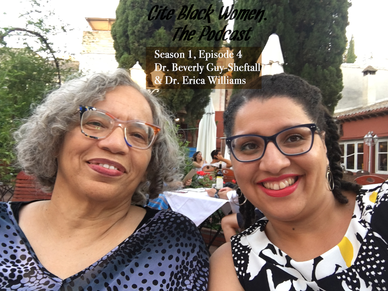
In this special Valentine's Day/Black History Month Episode of the Cite Black Women podcast, we feature a conversation between collective member Dr. Erica Williams and the world renowned Black feminist scholar Dr. Beverly Guy-Sheftall. Listen to them discuss their #love for Black women's work, their passion for writing, the importance of friendship in the academy and collaborative research, and why Cite Black Women is a project that we need right now. Enjoy.
Dr. ERIC LORRAINE WILLIAMS is Associate Professor and Department Chair of the Sociology and Anthropology department at Spelman College in Atlanta, Georgia. She has a Ph.D. and M.A. in Cultural Anthropology from Stanford University, and a B.A. in Anthropology and Africana Studies from New York University. She is the author of Sex Tourism in Bahia: Ambiguous Entanglements (2013), which won the National Women’s Studies Association/University of Illinois Press First Book Prize in 2011. She is also a co-editor of The Second Generation of African American Pioneers in Anthropology, along with Ira Harrison and Deborah Johnson-Simon(University of Illinois Press, 2018). She is Contributing Editor to the Handbook of Latin American Studies (Sociology: Brazil section), and has published in Feminist Studies, Gender, Place, and Culture: A Journal of Feminist Geography,the Macmillan Interdisciplinary Handbook on Gender: Love, Transatlantic Feminisms: Women and Gender Studies in Africa and the Diaspora (2015), Policing Pleasure: Global Reflections on Sex Work and Public Policy(2011); and Taking Risks: Feminist Stories of Social Justice Research in the Americas(2014). She is currently working on a project on Afro-Brazilian feminist activism in Bahia, Brazil.
Dr. BEVERLY GUY-SHEFTALL is founding director of the Women’s Research and Resource Center, Anna Julia Cooper Professor of Women’s Studies at Spelman College, adjunct professor at Emory University’s Institute for Women’s Studies and past President of the National Women’s Studies Association (NWSA).
At the age of sixteen, Dr. Guy-Sheftall entered Spelman College where she majored in English and minored in secondary education. After graduating with honors, she attended Wellesley College for a fifth year of study in English, and then went on to Atlanta University to pursue a master’s degree in English. Her thesis was entitled, “Faulkner’s Treatment of Women in His Major Novels.” A year later Dr. Guy-Sheftall began her first teaching job in the Department of English at Alabama State University in Montgomery, Alabama. In 1971 she returned to her alma mater, Spelman College, and joined the English Department.
Dr. Guy-Sheftall has a long history of researching and writing about African American Women’s intellectual contributions. She co-edited the first anthology on Black women’s literature, Sturdy Black Bridges: Visions of Black Women in Literature, with Roseann P. Bell and Bettye Parker Smith in 1979. In 1983 she became founding editor of Sage: A Scholarly Journal on Black Women which was devoted exclusively to the experiences of women of African descent, which was published from 1983-1996. In 1991 she published her dissertation Daughters of Sorrow: Attitudes Toward Black Women, 1880-1920, and of course in 1995 she published her groundbreaking anthology, Words of Fire: An Anthology of African American Feminist Thought.
Dr. ERIC LORRAINE WILLIAMS is Associate Professor and Department Chair of the Sociology and Anthropology department at Spelman College in Atlanta, Georgia. She has a Ph.D. and M.A. in Cultural Anthropology from Stanford University, and a B.A. in Anthropology and Africana Studies from New York University. She is the author of Sex Tourism in Bahia: Ambiguous Entanglements (2013), which won the National Women’s Studies Association/University of Illinois Press First Book Prize in 2011. She is also a co-editor of The Second Generation of African American Pioneers in Anthropology, along with Ira Harrison and Deborah Johnson-Simon(University of Illinois Press, 2018). She is Contributing Editor to the Handbook of Latin American Studies (Sociology: Brazil section), and has published in Feminist Studies, Gender, Place, and Culture: A Journal of Feminist Geography,the Macmillan Interdisciplinary Handbook on Gender: Love, Transatlantic Feminisms: Women and Gender Studies in Africa and the Diaspora (2015), Policing Pleasure: Global Reflections on Sex Work and Public Policy(2011); and Taking Risks: Feminist Stories of Social Justice Research in the Americas(2014). She is currently working on a project on Afro-Brazilian feminist activism in Bahia, Brazil.
Dr. BEVERLY GUY-SHEFTALL is founding director of the Women’s Research and Resource Center, Anna Julia Cooper Professor of Women’s Studies at Spelman College, adjunct professor at Emory University’s Institute for Women’s Studies and past President of the National Women’s Studies Association (NWSA).
At the age of sixteen, Dr. Guy-Sheftall entered Spelman College where she majored in English and minored in secondary education. After graduating with honors, she attended Wellesley College for a fifth year of study in English, and then went on to Atlanta University to pursue a master’s degree in English. Her thesis was entitled, “Faulkner’s Treatment of Women in His Major Novels.” A year later Dr. Guy-Sheftall began her first teaching job in the Department of English at Alabama State University in Montgomery, Alabama. In 1971 she returned to her alma mater, Spelman College, and joined the English Department.
Dr. Guy-Sheftall has a long history of researching and writing about African American Women’s intellectual contributions. She co-edited the first anthology on Black women’s literature, Sturdy Black Bridges: Visions of Black Women in Literature, with Roseann P. Bell and Bettye Parker Smith in 1979. In 1983 she became founding editor of Sage: A Scholarly Journal on Black Women which was devoted exclusively to the experiences of women of African descent, which was published from 1983-1996. In 1991 she published her dissertation Daughters of Sorrow: Attitudes Toward Black Women, 1880-1920, and of course in 1995 she published her groundbreaking anthology, Words of Fire: An Anthology of African American Feminist Thought.
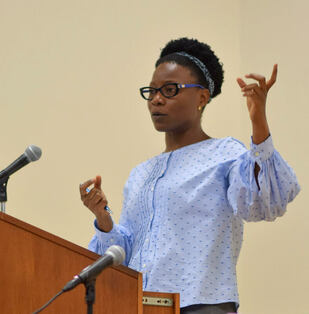
Season 1, Episode 3: “Transnationalism, Anti-Imperialism & Citation with Dr. Keisha-Khan Perry"
In this Martin Luther King Day special podcast, we honor the legacy of Ella baker with a discussion of Black women’s radical activism, citational politics and transnationalism. The conversation begins with a brief introduction on Ella Baker and the visionary leadership of the Black women who surrounded Dr. King. We then move into an interview that host Christen Smith conducted with Dr. Keisha-Khan Perry (Brown University) in November 2018. Keisha Khan Perry is a feminist anthropologist and political activist whose research focuses on urban social movements against the violence of forced displacement. She is the author of the prize-winning book, Black Women against the Land Grab: The Fight for Racial Justice in Brazil, an ethnographic study of black women’s activism for housing and land rights in the northeastern Brazilian city of Salvador. With an emphasis on the United States, Jamaica, and Brazil, she continues to write on issues of black land ownership and loss and the related gendered racial logics of black dispossession in the African diaspora. She recently served on the Latin American Studies Association delegation to investigate the impeachment of Brazilian President Dilma Rousseff.
In this Martin Luther King Day special podcast, we honor the legacy of Ella baker with a discussion of Black women’s radical activism, citational politics and transnationalism. The conversation begins with a brief introduction on Ella Baker and the visionary leadership of the Black women who surrounded Dr. King. We then move into an interview that host Christen Smith conducted with Dr. Keisha-Khan Perry (Brown University) in November 2018. Keisha Khan Perry is a feminist anthropologist and political activist whose research focuses on urban social movements against the violence of forced displacement. She is the author of the prize-winning book, Black Women against the Land Grab: The Fight for Racial Justice in Brazil, an ethnographic study of black women’s activism for housing and land rights in the northeastern Brazilian city of Salvador. With an emphasis on the United States, Jamaica, and Brazil, she continues to write on issues of black land ownership and loss and the related gendered racial logics of black dispossession in the African diaspora. She recently served on the Latin American Studies Association delegation to investigate the impeachment of Brazilian President Dilma Rousseff.
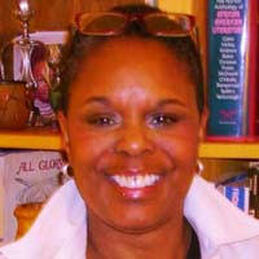
Season 1, Episode 2: "Dr. Dana-Ain Davis - "Citation as Spiritual Practice--Poetry, Love and Black Women's Story Telling"
S1, E2: Dr. Dána-Ain Davis:
In this episode, Dr. Dána-Ain Davis — activist, anthropologist, poet, doula, mother, grandmother— discusses citation as spiritual practice, poetry, love, birth and Black Women's storytelling with CBW's Christen Smith. This reflective and insightful conversation takes on a journey from her research to the possibilities and horizons of storytelling as radical engagement with Black women’s lives. Dána-Ain Davis is Professor of Urban Studies and Anthropology. She is the director of the Center for the Study of Women and Society at the Graduate Center. Davis’ work covers two broad domains: Black feminist ethnography and the dynamics of race and racism. With regard to the latter, she has examined the ways race and racism animate neoliberalism and reproduction. This project has resulted in one co-edited volume with Shaka McGlotten, Black Genders and Sexualities(2013) and two single authored books Battered Black Women and Welfare Reform: Between a Rock and Hard Place (2006) and Reproductive Injustice: Racism, Pregnancy, and Premature Birth (2019).Davis has co-edited or co-authored two books on feminist ethnography with Christa Craven, reasserting the importance of feminist ethnographic production as intervention. The most recent being Feminist Ethnography: Thinking Through Methodologies, Challenges and Possibilities (2016).
S1, E2: Dr. Dána-Ain Davis:
In this episode, Dr. Dána-Ain Davis — activist, anthropologist, poet, doula, mother, grandmother— discusses citation as spiritual practice, poetry, love, birth and Black Women's storytelling with CBW's Christen Smith. This reflective and insightful conversation takes on a journey from her research to the possibilities and horizons of storytelling as radical engagement with Black women’s lives. Dána-Ain Davis is Professor of Urban Studies and Anthropology. She is the director of the Center for the Study of Women and Society at the Graduate Center. Davis’ work covers two broad domains: Black feminist ethnography and the dynamics of race and racism. With regard to the latter, she has examined the ways race and racism animate neoliberalism and reproduction. This project has resulted in one co-edited volume with Shaka McGlotten, Black Genders and Sexualities(2013) and two single authored books Battered Black Women and Welfare Reform: Between a Rock and Hard Place (2006) and Reproductive Injustice: Racism, Pregnancy, and Premature Birth (2019).Davis has co-edited or co-authored two books on feminist ethnography with Christa Craven, reasserting the importance of feminist ethnographic production as intervention. The most recent being Feminist Ethnography: Thinking Through Methodologies, Challenges and Possibilities (2016).
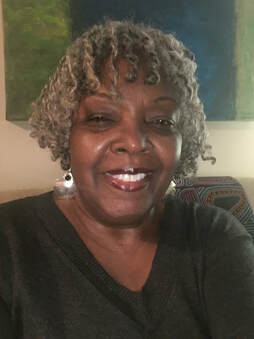
Season 1, Episode 1: "Citation and the Black Feminist Archive with Dr. Irma McClaurin.
Season 1, Episode 1: - Christen Smith and Irma McClaurin
In this episode, Dr. Irma McClaurin talks with CBW's Christen Smith about the importance of Black feminist archiving for the project of citation. Through the story of the, "Irma McClaurin Black Feminist Archive", Dr. McClaurin discusses her work to preserve Black women's intellectual contributions through the years, including the work of Zora Neale Hurston.
Irma McClaurin, PhD/MFA (http://irmamcclaurin.com), is an award-winning writer, activist (bio cultura)l anthropologist and consultant and founder of the, “Irma McClaurin Black Feminist Archive” at the University of Massachusetts Amherst. She is the Editor of “Black Feminist Anthropology: Theory, Politics, Praxis and Poetics, an “Outstanding Academic Title,” a past president of Shaw University, and in 2015 was named “Best Columnist in the Nation” by the Black Press of America.
Please consider donating to her archive here: bit.ly/blackfemarchive. This donation goes directly to UMass Amherst and is tax deductible. The goal is to reach $25k so it can be endowed. For inquiries or to donate materials. please email [email protected].
Season 1, Episode 1: - Christen Smith and Irma McClaurin
In this episode, Dr. Irma McClaurin talks with CBW's Christen Smith about the importance of Black feminist archiving for the project of citation. Through the story of the, "Irma McClaurin Black Feminist Archive", Dr. McClaurin discusses her work to preserve Black women's intellectual contributions through the years, including the work of Zora Neale Hurston.
Irma McClaurin, PhD/MFA (http://irmamcclaurin.com), is an award-winning writer, activist (bio cultura)l anthropologist and consultant and founder of the, “Irma McClaurin Black Feminist Archive” at the University of Massachusetts Amherst. She is the Editor of “Black Feminist Anthropology: Theory, Politics, Praxis and Poetics, an “Outstanding Academic Title,” a past president of Shaw University, and in 2015 was named “Best Columnist in the Nation” by the Black Press of America.
Please consider donating to her archive here: bit.ly/blackfemarchive. This donation goes directly to UMass Amherst and is tax deductible. The goal is to reach $25k so it can be endowed. For inquiries or to donate materials. please email [email protected].
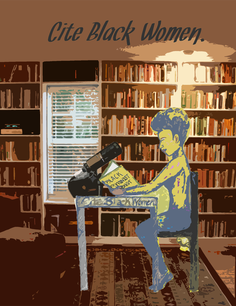
Season 1, Episode 0: "We are the Cite Black Women Collective"
Season 1, Episode 0: - Christen Smith and Michaela Machicote
In this inaugural episode, CBW founder, Christen Smith and CBW Collective member and producer Michaela Machicote introduce Cite Black Women's podcast initiative, the history of the CBW project, and the radical Black feminist legacy of Audre Lorde that has been one of its primary inspirations.
Season 1, Episode 0: - Christen Smith and Michaela Machicote
In this inaugural episode, CBW founder, Christen Smith and CBW Collective member and producer Michaela Machicote introduce Cite Black Women's podcast initiative, the history of the CBW project, and the radical Black feminist legacy of Audre Lorde that has been one of its primary inspirations.
